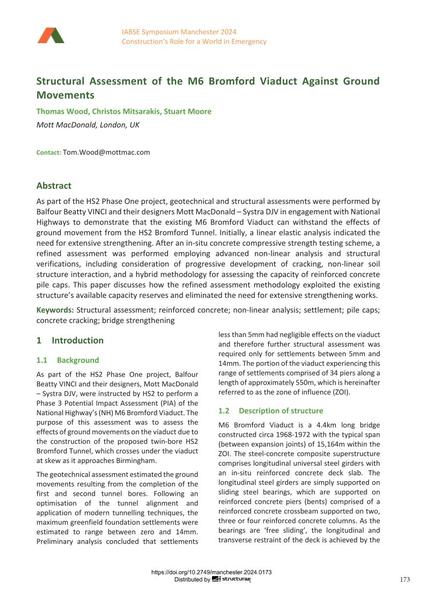Structural Assessment of the M6 Bromford Viaduct Against Ground Movements

|
|
|||||||||||
Détails bibliographiques
| Auteur(s): |
Thomas Wood
(Mott MacDonald, London, UK)
Christos Mitsarakis (Mott MacDonald, London, UK) Stuart Moore (Mott MacDonald, London, UK) |
||||
|---|---|---|---|---|---|
| Médium: | papier de conférence | ||||
| Langue(s): | anglais | ||||
| Conférence: | IABSE Symposium: Construction’s Role for a World in Emergency, Manchester, United Kingdom, 10-14 April 2024 | ||||
| Publié dans: | IABSE Symposium Manchester 2024 | ||||
|
|||||
| Page(s): | 173-181 | ||||
| Nombre total de pages (du PDF): | 9 | ||||
| DOI: | 10.2749/manchester.2024.0173 | ||||
| Abstrait: |
As part of the HS2 Phase One project, geotechnical and structural assessments were performed by Balfour Beatty VINCI and their designers Mott MacDonald – Systra DJV in engagement with National Highways to demonstrate that the existing M6 Bromford Viaduct can withstand the effects of ground movement from the HS2 Bromford Tunnel. Initially, a linear elastic analysis indicated the need for extensive strengthening. After an in-situ concrete compressive strength testing scheme, a refined assessment was performed employing advanced non-linear analysis and structural verifications, including consideration of progressive development of cracking, non-linear soil structure interaction, and a hybrid methodology for assessing the capacity of reinforced concrete pile caps. This paper discusses how the refined assessment methodology exploited the existing structure’s available capacity reserves and eliminated the need for extensive strengthening works. |
||||
| Mots-clé: |
tassement semelles
|
||||
